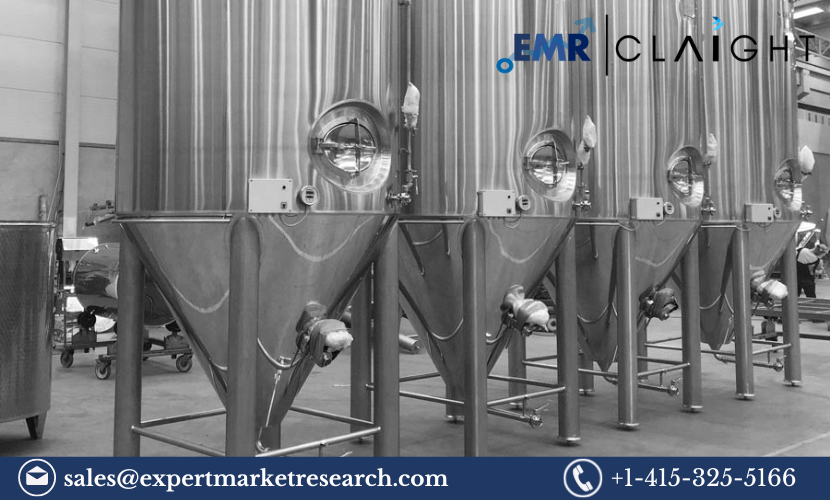The Fermenters market, valued at approximately USD 1.59 billion in 2023, is set to expand significantly in the coming years, growing at a robust compound annual growth rate (CAGR) of 5.70% to reach USD 2.63 billion by 2032. Fermenters, crucial in the biotechnology and food industries, facilitate the cultivation of microorganisms to produce biologics, enzymes, biofuels, and other essential bioproducts. This article delves deeply into the factors driving this growth, the latest industry trends, the competitive landscape, and what the future holds for the fermenters market.
Market Dynamics
1. Increasing Demand for Biopharmaceuticals
Biopharmaceuticals, including vaccines, insulin, monoclonal antibodies, and cell therapies, rely heavily on fermentation processes for production. The global shift towards biologics, driven by rising incidences of chronic diseases, aging populations, and growing interest in personalized medicine, is a key driver of fermenters’ demand.
Detailed Analysis:
The COVID-19 pandemic brought biopharmaceutical manufacturing into the global spotlight, with an unprecedented focus on vaccine production, much of which depended on advanced fermentation technology. The mRNA vaccines, for instance, required large-scale fermentation of DNA plasmids used in their production. Beyond COVID-19, the demand for other biologics, such as cancer immunotherapies, is expected to continue growing, further driving fermenter adoption.
Moreover, the trend toward personalized medicine is accelerating the use of fermenters. Biopharmaceutical companies are increasingly using fermentation in the development of customized therapies that target specific genetic markers, especially in oncology and rare diseases. This trend requires smaller batch fermenters and continuous processing, enabling flexible manufacturing processes to produce tailored treatments on demand.
2. The Push for Sustainable Bio-Based Production
With growing global concerns about climate change and resource depletion, industries are shifting towards more sustainable and environmentally friendly production methods. Fermentation is at the core of this transformation, playing a pivotal role in producing bio-based chemicals, biofuels, and biodegradable plastics that can reduce dependence on fossil fuels.
In-Depth Insight:
Biofuels such as ethanol and biodiesel are produced through fermentation processes that convert biomass into energy-rich compounds. Ethanol fermentation, for instance, is one of the most mature applications, with major economies such as the U.S., Brazil, and the EU investing heavily in its production. The fermentation process not only provides a renewable energy source but also helps reduce greenhouse gas emissions.
Additionally, the bioplastics industry is leveraging fermenters to produce biodegradable plastics like polylactic acid (PLA), which is derived from fermented corn starch. As sustainability becomes a key focus for manufacturers and consumers alike, the fermenters market is seeing increased demand in the bio-based chemicals segment. Leading companies are working on enhancing the efficiency of fermenters to scale up production and reduce costs.
3. Technological Advancements in Fermenters
The fermenters market is undergoing a technological revolution, with innovations ranging from single-use bioreactors to advanced digital control systems. These advancements are streamlining production processes, reducing contamination risks, and improving scalability in biomanufacturing.
Detailed Analysis:
Single-Use Fermenters are emerging as a game-changing technology in the biopharmaceutical industry. Unlike traditional stainless-steel fermenters, single-use systems are pre-sterilized, reducing the need for costly cleaning and sterilization processes. This is particularly beneficial in multi-product facilities or contract manufacturing organizations (CMOs), where flexibility and quick turnaround times are essential.
Single-use fermenters are ideal for small-batch productions such as those needed for clinical trials and personalized medicines. As a result, they are becoming the preferred choice for biopharmaceutical companies looking to maintain high product purity and reduce cross-contamination risks.
Automation and Digital Monitoring are other key trends shaping the fermenters market. Advanced sensors and IoT (Internet of Things) technologies now allow real-time monitoring of critical process parameters such as pH, temperature, dissolved oxygen, and nutrient levels. This data is fed into sophisticated control systems that optimize the fermentation process in real time, ensuring product consistency and maximizing yields. Predictive maintenance systems, powered by machine learning algorithms, are also being integrated into fermenters, minimizing downtime and reducing operational costs.
Key Market Segmentation
1. By Product Type
- Batch Fermenters: Traditional systems that offer precise control over fermentation conditions. Batch fermenters are widely used in industries that require periodic fermentation processes, such as antibiotic and enzyme production.
- Fed-Batch Fermenters: A hybrid system where nutrients are added to the fermenter throughout the process. This method is gaining popularity in the pharmaceutical industry due to its ability to increase product yield without compromising quality.
- Continuous Fermenters: A system where substrates are continuously fed into the fermenter, allowing for non-stop production. Continuous fermenters are critical for large-scale industrial applications such as biofuel and bioplastic production, where process efficiency is paramount.
Trending Insight:
Continuous fermenters are witnessing rapid adoption in the biofuels sector. Ethanol and biodiesel production, which require high volume, uninterrupted processes, benefit from this method’s ability to maximize output while minimizing costs.
2. By End-User
- Biopharmaceutical Industry: The dominant segment, driven by rising biologics production.
- Food and Beverage Industry: Growing demand for fermented food products such as probiotics, kombucha, and plant-based proteins is spurring fermenter demand.
- Cosmetics Industry: The use of fermentation in the production of active cosmetic ingredients, such as hyaluronic acid, is increasing.
- Agriculture and Biofuel Industry: Fermentation plays a pivotal role in producing biofertilizers, animal feed, and renewable energy.
Regional Insights
1. North America: Leading the Charge in Biopharmaceuticals
North America remains a dominant player in the fermenters market, particularly in the biopharmaceutical sector. The presence of advanced research institutions, strong investments in biotechnology, and robust government support for the biofuels industry are key factors propelling market growth.
Detailed Analysis:
The U.S. government’s policies promoting biofuel production and the country’s leadership in biologic drug development create a favorable environment for fermenter manufacturers. Key biopharmaceutical hubs such as Boston, San Francisco, and Raleigh-Durham are expanding their fermentation capacities to meet growing global demand for biologics.
2. Asia-Pacific: A Hotbed for Growth
Asia-Pacific is emerging as the fastest-growing market for fermenters, driven by the rapid expansion of the biotechnology, pharmaceutical, and food industries in China and India. The region’s cost-effective manufacturing capabilities and rising government initiatives to promote bio-based industries are key factors driving this growth.
Detailed Analysis:
China’s ambitious biotech initiatives, such as its “Made in China 2025” program, aim to transform the country into a leader in biopharmaceutical innovation, which will further drive fermenter demand. Similarly, India’s biotechnology sector is flourishing, with the government’s “Make in India” initiative encouraging local production of biologics, biofuels, and bioplastics.
Competitive Landscape
The fermenters market is characterized by intense competition, with companies focusing on capacity expansions, mergers, and acquisitions to enhance their market position. Key players include:
- Sartorius AG: Leading the market with cutting-edge bioprocess solutions, Sartorius has been expanding its single-use fermenter portfolio.
- Eppendorf AG: Known for laboratory-scale fermenters, Eppendorf is expanding into large-scale industrial applications.
- GEA Group: A global player in process engineering, GEA is investing heavily in advanced fermentation technologies.
- Thermo Fisher Scientific Inc.: With a broad portfolio of bioprocessing products, Thermo Fisher is focusing on innovation in continuous fermentation and digital monitoring solutions.
Trending Insight:
Recent mergers and acquisitions in the bioprocessing space are shaping the competitive landscape, with companies looking to consolidate their market positions and enhance their technological capabilities. For example, the acquisition of Cytiva (formerly GE Healthcare Life Sciences) by Danaher has created a bioprocessing powerhouse that is driving innovation in fermentation systems.







